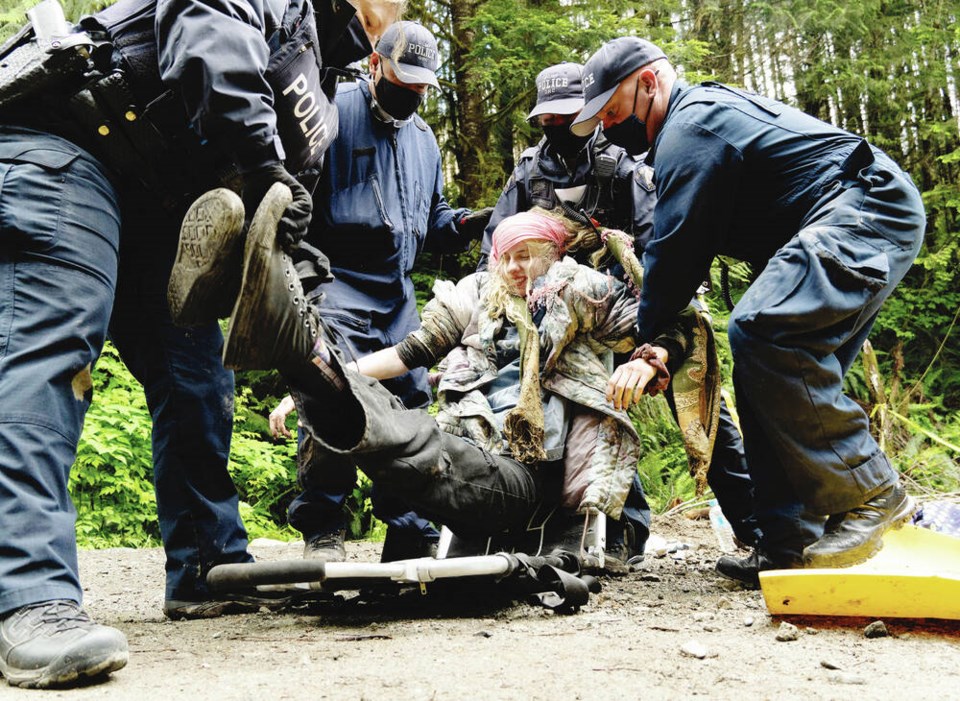The Union of B.C. Indian Chiefs has demanded a special RCMP unit responsible for responding to pipeline and forestry protests be disbanded during a federal review launched earlier this year.
A day after the First Nation group made the call in an open letter sent to RCMP and federal and provincial representatives, the RCMP announced it would resume police enforcement of a court-ordered injunction granted to Teal Cedar Products to allow logging to continue unimpeded in the Fairy Creek Watershed area near Lake Cowichan on Vancouver Island.
The federal investigation by the Civilian Review and Complaints Commission for the RCMP was launched in March over concerns the RCMP unit’s tactics may not have been consistent with the Canadian Charter of Rights and Freedoms.
For example, those opposing logging by Teal Cedar at the Fairy Creek watershed that included Indigenous protesters have argued the RCMP’s Community-Industry Response Group went too far enforcing injunctions at logging sites in impeding their movements, arresting them, detaining them and seizing their property.
The complaints commission has said it will be investigating the unit’s actions in at least three court-ordered injunction sites: at Fairy Creek, at the Coastal GasLink natural gas pipeline on Wet’suwet’en traditional territory in northern B.C., and at a Cooper Creek Cedar logging site near Argenta in the West Kootenay.
“This is not a new issue. It was triggered by the paramilitary tactics by this group. They use this as their standard approach engaging with Indigenous people who are out on the land taking issue with a particular development project,” Grand Chief Stewart Phillip, president of the Union of B.C. Indian Chiefs, said Tuesday.
“And it’s escalating. And there is no accountability on the part of the senior command of the RCMP,” Phillip added.
The open letter published Monday — signed by Phillip and vice-president and chief Don Tom and secretary-treasurer and chief Marilyn Slett — is addressed to the head of the complaints commission Michelaine Lahaie, RCMP deputy commissioner Dwayne McDonald, who heads the force in B.C., B.C. Public Safety Minister Mike Farnworth and the federal public safety minister.
The union has also called on the complaints commission to expand the terms of reference to include a broader inquiry with more investigative powers, which was done in the commission’s investigation into similar complaints involving the RCMP’s response to Mi’kmaw-led anti-fracking protests in New Brunswick in 2013.
In that investigation, released in 2020, the commission found shortcomings with the RCMP’s crowd-control measures, physical searches and collection of social media information.
In B.C., the RCMP’s Community-Industry Response Group was formed in 2017 to provide a co-ordinated response to public order events related to large-scale, resource-based industrial projects in B.C.
RCMP commanders have said the unit is staffed by as-needed volunteers whose deployment is secondary to their regular duties.
On Tuesday, the RCMP did not immediately respond to Postmedia questions on whether they were aware of the union’s call to disband the unit or whether it was under consideration.
The complaints commission also did not respond to questions Tuesday on when its investigation will be completed and whether it would consider the union’s request to expand the investigation.
The RCMP said in a news release on Tuesday that police enforcement was returning to the Fairy Creek watershed because Teal Cedar has reported numerous violations of people obstructing, impeding and interfering with their ability to perform work over the past several weeks.
The renewed enforcement of the B.C. Supreme Court injunction, issued in April 2021, comes less than a week after the Supreme Court of Canada confirmed the acquittal of a protester at the same site because police failed to fully read the court order.
The RCMP said operations will begin with the police liaison team, which will advise individuals blockading the bridge that enforcement will commence.
RCMP said protesters will be given the opportunity to remove their blockade and leave the area or relocate to allow the company passage across the bridge — which is outlined in the injunction — or face arrest.
“Arrests are made as a last resort, over meaningful dialogue and negotiation. However, due to the ongoing nature of the complaints we can no longer delay enforcing a court-ordered injunction,” RCMP superintendent Ken Floyd, a gold commander who oversees the response group, said in a written statement.
Confrontations between police and protesters have led to more than 1,100 arrests since 2021, but when a court tossed out one case because police didn’t read the entire injunction, dozens more acquittals followed and B.C.’s prosecution service dropped 146 cases after the high court’s decision last Thursday.
— With files from The Canadian Press and David Carrigg



